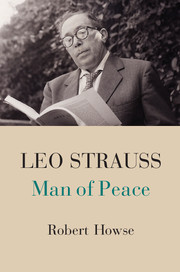Book contents
- Frontmatter
- Dedication
- Contents
- Preface and Acknowledgments
- 1 Introduction
- 2 Warrior Morality and the Fate of Civilization
- 3 Legitimacy and Legality, Thinking and Ruling in the Closed Society and the World State
- 4 Strauss’s Machiavelli
- 5 Thucydides versus Machiavelli
- 6 Justice and Progress
- 7 Conclusion
- Abbreviations
- Index
- References
3 - Legitimacy and Legality, Thinking and Ruling in the Closed Society and the World State
The Strauss/Kojève Debate
Published online by Cambridge University Press: 05 September 2014
- Frontmatter
- Dedication
- Contents
- Preface and Acknowledgments
- 1 Introduction
- 2 Warrior Morality and the Fate of Civilization
- 3 Legitimacy and Legality, Thinking and Ruling in the Closed Society and the World State
- 4 Strauss’s Machiavelli
- 5 Thucydides versus Machiavelli
- 6 Justice and Progress
- 7 Conclusion
- Abbreviations
- Index
- References
Summary
Leo Strauss’s exchange with Alexandre Kojève concerning Xenophon’s On Tyranny is among the most famous debates between philosophers in the twentieth century – popularized but also distorted by Allan Bloom and, especially, Francis Fukuyama in his The End of History and the Last Man. The essay by Strauss that initiated the controversy, “On Tyranny”, was penned at the end of his stint at the New School, shortly before moving from New York to Chicago. Here we observe for the first time Strauss explicitly deploying the classical perspective on thinking and political action in responding to the challenge described in “German Nihilism” at the beginning of the New School period, namely, the need to answer and check philosophical temptations to political extremism. Studying the way in which Strauss deploys the classics in On Tyranny will allow us to understand the complexity and subtlety of Strauss’s approach to thinkers such as Machiavelli and Thucydides in later works, readings that have given rise to much suspicion, controversy, and confusion among specialists and public intellectuals alike.
The issues that are raised in the debate with Kojève go to the core of Strauss’s thinking about the relationship(s) among law, philosophy, and political violence. The topics of controversy include the relation of legality to legitimacy and of both to violence; whether and how philosophers and intellectuals ought to guide violent political change; and whether a world state or universal society is possible, desirable, or even inevitable.
- Type
- Chapter
- Information
- Leo StraussMan of Peace, pp. 51 - 81Publisher: Cambridge University PressPrint publication year: 2014



